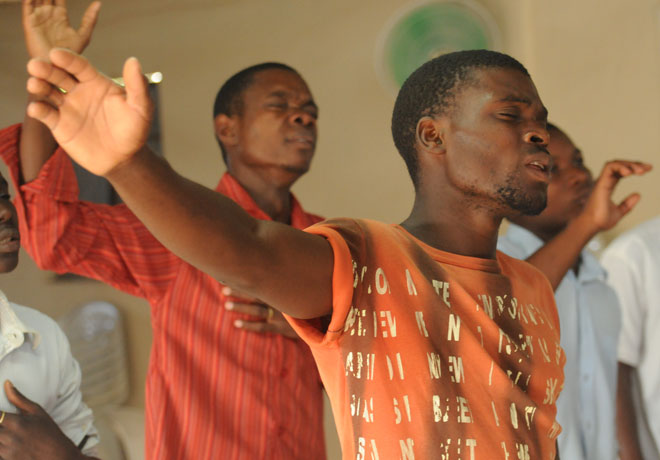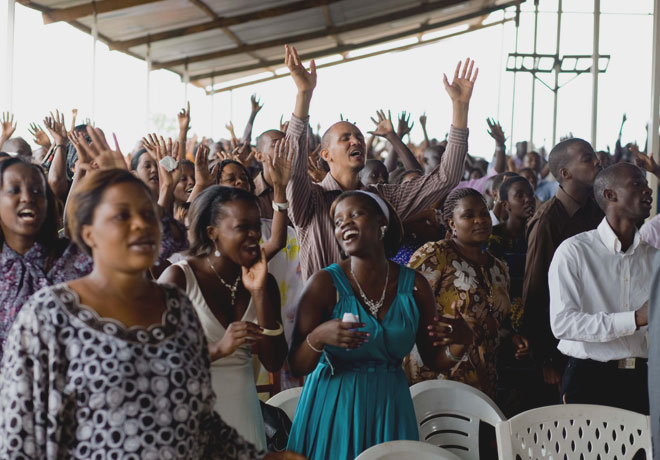Ever since the missionary era, Christianity has had a positive impact on the socio-cultural arena throughout Africa. In addition to involvement in evangelism and discipleship, a variety of Christian communities were behind the founding and growth of primary, secondary, and tertiary educational institutions, health facilities, poverty alleviation projects, children’s homes, and even civic initiatives. As a result, not only does Christianity continue to grow across much of the continent, but it has also achieved significant public acceptance as a force of social good.
The rise of false prophets
Now, however, there is a worrying sense that certain practices are chipping away at its historic moral credibility and public strength. From an ecclesiological and theological perspective, the core of the problem lies with the rapid rise and media visibility of ‘dodgy’ (ie dubious) pastors, who are the false prophets of our day. Among the many self-proclaimed ‘men of God’ or ‘servants of God’, the values that have traditionally distinguished Christian ministry are increasingly absent:
- Values such as humility, compassion, selfless service, and servant leadership are now increasingly replaced by a preoccupation with image consciousness, self-aggrandizement, and enlargement of personal ministry influence at whatever cost.
- Previously, values such as generosity and charity, accompanied by frugal lifestyle, were self-evident markers of good church leaders, pastors, clergy, and any kinds of church workers such as evangelists or catechists. In the face of difficulty, a poor Christian could expect to get temporal help even from a materially impoverished pastor who would share the little they have. These values of previous generations of Christian workers are increasingly replaced by what seems to be an indiscriminate emphasis on material blessedness as a marker of a genuine relationship with God.
Reasons behind it
There are many reasons for the sharp rise in self-proclaimed prophets:
- In a continent where the church is growing exponentially faster than in any other period in history, the biblical paradox of both wheat and weeds growing together is real.
- Many of these prophets are taking advantage of the numerous challenges faced by a continent that is undergoing rapid social transformation.
- Africans are a naturally religious people. As scholars have repeatedly pointed out, African cosmology does not separate the spiritual from the non-spiritual; therefore, economic, medical, and cultural spheres of reality are open to multiple interpretations.
Even charismatic prophets who have served well in the past are capable of being sidetracked by fame, success, and pride to the point of becoming charlatans to maintain their image. As Jesus mentioned in that parable of the wheat and the tares, in a field that is truly alive with the rain of the Spirit of God, it is hard to distinguish the work of the devil. Therefore, we in Christian ministry and in theological reflection increasingly need to raise this issue, and to keep searching the Scriptures, to guide more Christians in the right direction.
 Genuine prophets versus false: A biblical perspective
Genuine prophets versus false: A biblical perspectiveAccording to charismatic theology, as one of the leadership offices of the Old Testament (1 Sam 9:9, 11, 19; 2 Sam 15: 27) and New Testament (Eph 4: 11), the prophetic office is available to selected men and women (Acts 2:17). Charismatics teach that women such as Miriam (Exod 15:20), Deborah (Judges 4:4), Huldah (2 Kings 22:14; 2 Chron 34:22), Noadiah (Neh 6:14), and Anna (Luke 2:36) joined the ranks of men called to direct, build up, and mature the people of God as a God-fearing community.
Charismatics believe a prophet who is called by God serves as a reliable channel of communication between God and humanity in specific places and under specific circumstances (1 Kings 17: 1). They also might be called to reveal or predict things that are otherwise hidden, in order to restore truth, and encourage the pursuit of justice in whole nations (Amos; Jonah). A prophet might also challenge evil among leaders in the wider society (Dan 5: 13-31; Nathan in 2 Sam 12:1-12 and John the Baptist in Matt 14: 1-12).
Prophets whose intentions are self-centered or evil have been around since biblical times (Matt 7: 15-20; Acts 13: 6-12; 2 Pet 2: 1-3; Jer: 29:9). Three things distinguish a genuine prophet from false:A genuine prophet is often trained through a long and proven relationship with God.Their conduct does not contradict the Word of God (1 John 4:1-3).Their predictions come to pass and often lead to good outcomes in society, particularly in the interests of the poor and marginalized (Deut 18:20-22; Num 23:19; Ezek 33:33; 1 Sam 3:19. 2 Chron 18:13 and Matt 24:35).
The African context
For many decades, the pluralistic religious worldviews of African cosmology and the obvious contemporary religiosity of Africans have been a focus for study among leading African scholars, including currently Nimi Wariboko, Opuku Onyina, Ogbu Kalu, and Kwabena Asamoah-Gyadu. Ogbu Kalu argues that Africans’ worldview approaches the whole of reality through multiple cultural and religious prisms.[1] In traditional causality, understanding—and improvement of—destiny, averting evil, survival, and preservation of the good happen through religious intervention.[2]
In their many studies of religion and African society, Stephen Ellis and Gerrie Ter Haar demonstrate the importance of taking Africans’ view of reality and cosmology into account when examining the role of religion in the public sphere. Africans have no structural distinction between the visible and invisible world, though the worlds are distinguishable.[3] The connectedness of the real and the unseen worlds is controlled by supernatural forces—forces of good and evil.[4] Consciousness of these good and evil forces is a major source of fear and anxiety.[5]
In order to be free from evil attacks, one must be intentional in seeking protection from religious functionaries who have access to supernatural forces of good. This belief puts religious functionaries in a strategic position as special mediators between the realms of sacred and secular, as well as the worlds of good and evil. According to Asamoah-Gyadu, ‘religious functionaries or specialists are people who on account of their closeness to the supernatural realities, possession of mystical power or intuition, and knowledge of the workings of mysterious religious formulae and objects, occupy center stage in religion as mouthpieces of transcendent beings and powers.’[6] Africans see religious functionaries as people who possess supernatural abilities to intervene in the uncertainties of life caused by the activities of spiritual forces in the invisible world. From an African perspective, this is what explains the prevalence of the prophetic ministry, both in its genuine charismatic expression, but now, in the perverted form that is discrediting the entire church. Some examples
Some examples
Recently in South Africa, victims of alleged sexual abuse detailed their experiences to the BBC and criticized the invulnerability of so-called men of God who use their ‘prophet’ positions to cover up abuse.[7] A severe backlash against church leaders prompted the South African President to urge South Africans to unite in curbing the menace of false pastors. This was followed by a three-day public protest, led by Solomon Izang Ashoms, founder of the Movement against Abuse in Churches. That this had to be a protest involving politicians and civil activists rather than the church, suggests the church is not playing its role as the light set on a hill or the salt of the earth.
Some claims of prophetic power verge on the ludicrous and irrational. Yet in an era of social media, their claims make them even more popular as poor and desperate people look for help wherever they can. A famous self-proclaimed prophet from Zimbabwe and another from Malawi both announced they had found cures for HIV/AIDS, preventing patients from seeking medical help. A South African preacher encourages his followers to eat grass and drink petrol, while another sprays insecticide on congregants to exercise deliverance from evil.[8]
There are those who make claims that border on blasphemy. At one point, a Kenyan prophet claimed to have the powers of Moses and Elijah, and to have toured heaven and held discussions with God. In 2017, police in Oyo State in Nigeria paraded a pastor who allegedly possessed a human head and ritual paraphernalia. Elsewhere, allegations of sexual abuse and swindling people of money and property often leak out into social media.
False prophets have cunningly learnt to parrot what impoverished or troubled followers are desperate to hear. Despite awareness of the abuses, self-proclaimed prophets retain thousands of followers who fund their activities.
Government interventions
In 2016, Kenya’s attorney-general proposed a lengthy list of requirements for churches, including minimum theological education, annual membership thresholds, and affiliation to umbrella organizations.[9] However, this protocol was quickly abandoned as the government and existing church organizations lacked willpower to enforce it. One of the more successful efforts at regulatory oversight has come from the Rwandan government that has introduced strict requirements for new and existing churches. These government measures are vital, but among churches a lot more work needs to be done based on a biblically grounded perspective.
What must the church do?
This enormous challenge highlights multiple issues to be addressed. Interventions need to include evaluating existing leadership recruitment and training models, including a reconsideration of the theological curriculum used to train leaders.[10] It is urgent that the church promotes the kind of biblical literacy and discipleship that will address the contemporary problems that lead congregants to these prophets in the first place.
These solutions will require intentional collaboration and coordination. This will involve local, pan-African, and global opportunities for networking, partnership, and peer mentoring among pastoral trainers and practitioners. Conferences that focus on biblical Christianity and the discipleship of Christian ministry practitioners will be needed. Finally, those who know the truth and are concerned about the current state of the African church should be praying for the building up of its foundations and its maturity as the church of Christ in Africa.
The Problem with False Prophets, Then and Now
Lewis Mutugi
Author
April 27, 2023
Enter ancient Israel around the early 600s/late 500s BC. They had a strong inkling that they would get taken over by the Babylonians, as many of their prophets, like Jeremiah and Ezekiel, more than hinted at their imminent ransack and capture to this global super power.
But Israel didn’t like receiving that bit of information. So they turned to people who had positive messages instead: the prophets who would say that Israel would enter a time of prosperity and wealth soon (
But Israel didn’t like receiving that bit of information. So they turned to people who had positive messages instead: the prophets who would say that Israel would enter a time of prosperity and wealth soon (Jeremiah 23:16). Many went as far to claim from receiving visions or a divine word to prove their prophecies rang true.
As history dictates, their “prophecies” never came to fruition.
In this article, we’ll explain the context of the times when false prophets appear in the Old Testament. Then we’ll highlight what both the Old and New Testament say about false prophets and how we can keep an eye out for deceivers today.
Where Did These False Prophets Come from?
False prophets usually didn’t appear unless a number of tragedies or less-than-pleasant events had occurred. Long story short, Israel had gotten itself into a rut. It had evil kings, chased after other gods, went as far as committing child sacrifice, and they also trusted in other foreign superpowers such as Egypt rather than placing their trust in the Lord.
Israel had been split into two kingdoms earlier. The first, the Northern Kingdom, got taken into captivity by a vicious group known as the Assyrians in 722 BC. The Southern Kingdom, seeing this, began to grow uneasy for their own fate.
For 130 years, nothing of significance happened, but they did feel the strain of the Babylonians demolishing other nations. Not to mention, their own kings couldn’t seem to maintain good relations with this kingdom.
Worried they may have a similar fate to that of the Northern kingdom, they tuned into some sources, false prophets, that assured them of the opposite would happen.
They would not only spout lies but would say they did so in the Lord’s name (
They would not only spout lies but would say they did so in the Lord’s name (Jeremiah 14:14, Zechariah 10:2).
Although the true prophets of God warned against listening to these deceivers, many people, including Israel’s kings, didn’t want to hear the truth. Instead, they endorsed the false information, which led them to a rather brutal siege and takeover of the Babylonians.
What Does the Bible Say about False Prophets?
Both the Old and New Testament have a great deal to say about false prophets. We’ll highlight some verses below and discuss some of the distinguishing characteristics of these wolves in sheep’s clothing.
Jeremiah 23:16 “Thus says the Lord of hosts: ‘Do not listen to the words of the prophets who prophesy to you, filling you with vain hopes. They speak visions of their own minds, not from the mouth of the Lord.’”
Matthew 7:15 “Beware of false prophets, who come to you in sheep's clothing but inwardly are ravenous wolves.”
Matthew 24:24 “For false christs and false prophets will arise and perform great signs and wonders, so as to lead astray, if possible, even the elect.”
2 Timothy 4:3 “For the time is coming when people will not endure sound teaching, but having itching ears they will accumulate for themselves teachers to suit their own passions.”
These passages make several factors abundantly clear. First, in order for a false prophet to succeed, we need people who crave information, no matter how false (see the 2 Timothy verse). If people want to continue to live in sin, they will choose a message that best suits their narrative. Therefore, they will listen to a false prophet.
Second, false prophets will not only claim divine visions and words, but they have the ability to perform signs and “miracles.”
Because they have Satan on their side, they will be able to wield a certain amount of supernatural power. A miracle or sign does not always mean God was behind it.
Third, they do not speak from Scripture. Most of the time you can compare their words with the Bible and see the two messages do not align.
What Can We Learn about False Prophets Today?
In our society, when we receive a bombardment of negativity on social media and in the news. A part of us does want to escape the trials and the difficulty. We cry out Marantha!, and hope Jesus will appear soon.
No matter where we fall on the dispensationalism spectrum, we also have to be wary of messages about evading tough times on earth or messages that prosperity is coming our way soon. God does provide, and God does bless, but we also need to analyze the sources in which we hear these messages.
No matter where we fall on the dispensationalism spectrum, we also have to be wary of messages about evading tough times on earth or messages that prosperity is coming our way soon. God does provide, and God does bless, but we also need to analyze the sources in which we hear these messages.
We also have to avoid something known as “toxic positivity” culture. This culture promotes only the sharing of positive messages. It has seeped into the church in such a way that teachers and preachers will avoid more heavy topics such as original sin and hell, among others, simply to appease the crowd.
Christianity is full of mercy and grace, but we cannot forget God’s judgment and wrath. Not because he wants to lord it over us like some threat. He does not. But we need to remember this because we cannot truly understand the nature of salvation unless we grasp how far we have fallen.
False prophets will promote narratives of prosperity, positivity, and human self-reliance. Think back to the Israelite kingdom just before the Babylonian invasion. False prophets told them if they just relied on the Egyptians (humans) they would prevail over Babylon. That didn’t happen.
Finally, whenever we’ve encountered what seems like a false prophet, we need to compare their words with Scripture. It doesn’t matter if they claim to have divine visions or if they appear to heal others or do miracles. If their messages does not agree with that of the Bible, we must reject their teachings.













